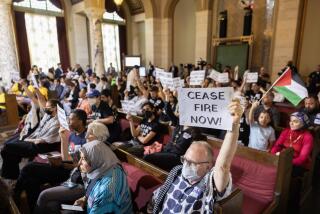KING CASE AFTERMATH: A CITY IN CRISIS : Jackson Issues Call for Calm : Appeal: Civil rights leader is welcomed by crowds affected by violence. He denounces rioting but calls for pressure on officials to ‘rebuild America.’
- Share via
In a series of whirlwind appearances across riot-scarred parts of Los Angeles on Friday, the Rev. Jesse Jackson pleaded for an end to violence and a renewal of hope.
“We want the looting and shooting to stop,” the civil rights activist and two-time presidential contender said at the First African Methodist Episcopal Church. “We want to fight the fires of indignation with the waters of development and new hope and new life.”
Yet though denouncing the rioting, Jackson repeatedly emphasized that, in his view, it was a foreseeable--and perhaps inevitable--reaction to continuing national patterns of racism, police brutality and economic despair.
“We need an alternative to the despair, the alienation and the hurt,” he said. “That becomes our challenge today--to put pressure on the community to help us stop the cycle of violence and fear. But also to put pressure on the President and Congress to put forth a plan to, in fact, rebuild America.”
Jackson, scheduled to remain in Los Angeles through Sunday, was greeted with applause, handshakes and a bevy of TV cameras as he toured churches, post offices and fire-ravaged shopping malls through the course of the day.
When he arrived at the post office at 43rd Street and Central Avenue shortly after noon, he found a weary crowd of more than 1,000 people waiting in line for first-of-the-month government assistance checks that could not be delivered Friday. To prevent violence, 21 National Guard members, rifles at the ready, stood at attention in the middle of the block.
At the sight of Jackson, many in the crowd perked up and cheered.
“He can pull us out of this--make people listen instead of burning and killing,” said 50-year-old Bertha Davis. After hugging Jackson, she explained that she already had been waiting for more than two hours to pick up her monthly Social Security check.
Charlotte McKoy, 21, burst into tears as she clung to Jackson. “We’re tired of living like this,” said McKoy, a medical records clerk. “Everyone is scared of each other. Even the people that get their checks have no place to take it to cash. (Check-cashing businesses) are all burned down. It doesn’t make no sense.”
Jackson hugged McKoy, told her that every individual can play a role in halting the violence, and then invited her to accompany him to lunch and later appearances during the day. She did.
Before leaving the post office, Jackson also shook hands with several of the National Guardsmen.
“Thanks for being here; we’re trying to help,” said one of the guardsmen.
“I hope it works out,” Jackson replied.
In an interview, Jackson said his presence in Los Angeles is important because he has the stature to attract widespread media attention and enthusiastic black crowds while still being able to arrange meetings with federal officials, labor leaders and church elders. That status, he said, gives him the ability to ease public fears while addressing long-range solutions.
During his stops, virtually the only criticism of Jackson came from a mother who had been standing in line for three hours at the post office.
“I can walk around and shake everybody’s hand and say, ‘Have a nice day’ too,” said Constance Ortega, 29. “But it doesn’t help. My kids are still hungry, and they still have no food.”
At each appearance, Jackson stressed that even while condemning the violence that erupted following the verdicts in the Rodney G. King beating case, its roots must be confronted.
The seeds were planted in the days of slavery, he said. And they have grown stronger due to halfhearted government efforts to improve economic and educational conditions since the urban riots of the 1960s.
The not guilty verdicts in the trial of the four Los Angeles police officers accused in the King case were but the final straw, he said.
“The (police) brutality must end,” Jackson said after standing in the charred remains of a Payless Shoe Source shop at the intersection of Western Avenue and Venice Boulevard. “We’re human beings. We demand our respect.”
Walking across the street to another burned-out strip mall and speaking over the background noise of police sirens, Jackson asserted that “spontaneous combustion” is always a possibility in a society that spends more money to keep a youngster in jail than it would cost to send him to college.
“Desperate people do desperate things,” Jackson said. “We must break the cycle of desperation.”
More to Read
Sign up for Essential California
The most important California stories and recommendations in your inbox every morning.
You may occasionally receive promotional content from the Los Angeles Times.










